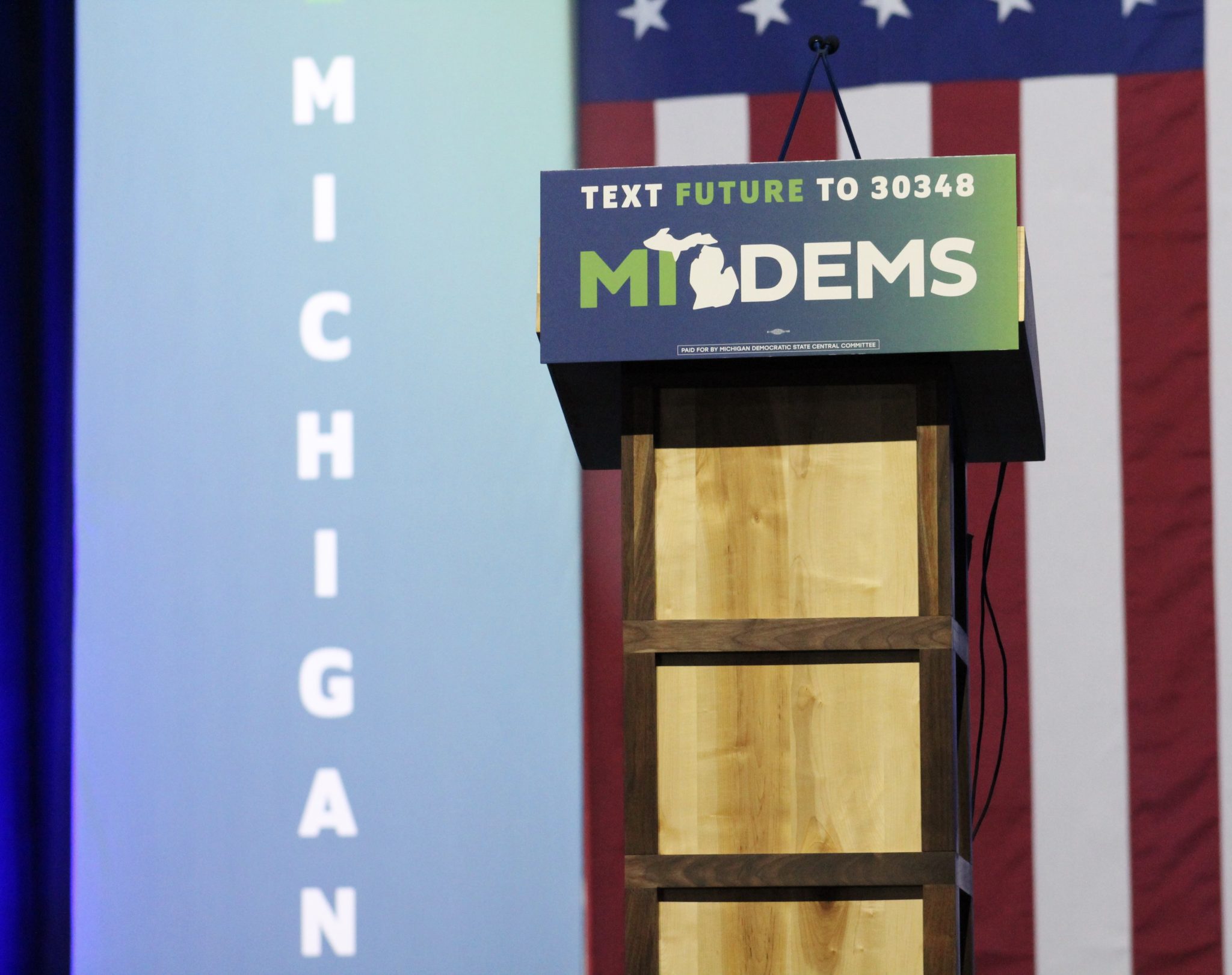MichMash: Unpacking Michigan’s historic 2022 midterm election
Patrick Bernas November 14, 2022In this episode of MichMash, Cheyna Roth talks with Sarah Rahal of the Detroit News to break down the future of Michigan’s elections.

Podium at the Michigan Democratic election night watch party at MotorCity Casino Hotel in Detroit on Nov. 8, 2022.
As the dust settles after a tense midterm election, Michigan Democrats control the Governor’s seat, state House and Senate for the first time in 40 years. In this episode of MichMash, Cheyna Roth talks with Sarah Rahal of the Detroit News to break down the future of Michigan’s elections.
Subscribe to MichMash on Apple Podcasts, Spotify, NPR.org or wherever you get your podcasts.
In this episode:
- The future of Michigan elections, with the passage of Proposal 2 requiring nine days of early in person voting.
- Governor Whitmer’s plans for Michigan now that Democrats control the state House and Senate.
- The role of absentee voting in pushing up Michigan’s voter turnout.
The 2022 midterm election was a record-breaking one, both nation-wide and in Michigan. Sarah Rahal of the Detroit News joined Cheyna Roth to break down the outcomes of Michigan’s midterms.
Michigan had a record turnout, with at least 4.45 million Michiganders casting votes in the election — more than in any other gubernatorial election. Rahal says this may have something to do with recent changes to the election process.
“I think that early voting really made a difference this term,” Rahal explains. “During that time, election pollers were able to process and record ahead, just make sure people were registered, do all the checks and balances, and then they fed them into the tabulators on election day.”
Over half of all ballots cast in Detroit were absentee ballots, which helped drive up turnout in some surprising ways.
“It reduces lines on election day, it gives an adequate amount of time to become knowledgeable about the ballot, and with Proposal 2’s passage, we will see military votes being counted while they are abroad,” said Rahal.
With the passage of Proposal 2, requiring nine days of early voting in Michigan, Rahal is hopeful that this will further increase the number of votes cast in Michigan.
Students and young voters were among those helping to push that record turnout. Rahal says that the proposals more so than the candidates themselves brought out the youth vote.
“Students were so excited to vote, some waited more than four hours in line, and it stretched all the way around buildings,” said Rahal. “In Ann Arbor, long lines formed around the Museum of Art, and it was issues like Proposal 3 that they felt empowered to be heard.”
Governor Gretchen Whitmer also secured re-election, beating her Republican opponent Tudor Dixon by 11 points. Democrats also took control of both the Michigan state House and Senate for the first time in 40 years. Rahal says that we could see Whitmer continue to push for the policies she has advocated for all along.
“Just like four years ago, Whitmer said she would focus on kitchen table issues like [access to clean] drinking water, affordable health care, education and fixing the roads,” said Rahal. “All of which will continue to be priorities in the next term.”
Related Posts:
- MichMash: Don’t sleep on your local school board races
- MichMash: Democrats eye control of Michigan Senate for first time in decades
- MichMash: Michigan Legislature passes $1 billion spending plan, sparking GOP criticism
Trusted, accurate, up-to-date.
WDET strives to make our journalism accessible to everyone. As a public media institution, we maintain our journalistic integrity through independent support from readers like you. If you value WDET as your source of news, music and conversation, please make a gift today.
